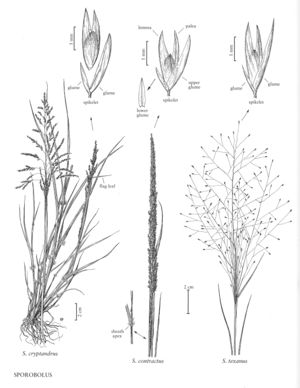Difference between revisions of "Sporobolus cryptandrus"
FNA>Volume Importer |
FNA>Volume Importer |
||
| Line 23: | Line 23: | ||
-->{{Treatment/Body | -->{{Treatment/Body | ||
|distribution=Wash.;Wis.;W.Va.;Kans.;N.Dak.;Nebr.;S.Dak.;Wyo.;N.H.;N.J.;N.Mex.;Tex.;La.;Conn.;N.Y.;N.C.;Tenn.;Pa.;R.I.;Nev.;Va.;Colo.;Calif.;Ark.;Vt.;Ill.;Ga.;Ind.;Iowa;Okla.;Ariz.;Idaho;Alta.;B.C.;Man.;Ont.;Que.;Sask.;Maine;Mass.;Ohio;Utah;Mo.;Minn.;Mich.;Mont.;Miss.;S.C.;Ky.;Oreg. | |distribution=Wash.;Wis.;W.Va.;Kans.;N.Dak.;Nebr.;S.Dak.;Wyo.;N.H.;N.J.;N.Mex.;Tex.;La.;Conn.;N.Y.;N.C.;Tenn.;Pa.;R.I.;Nev.;Va.;Colo.;Calif.;Ark.;Vt.;Ill.;Ga.;Ind.;Iowa;Okla.;Ariz.;Idaho;Alta.;B.C.;Man.;Ont.;Que.;Sask.;Maine;Mass.;Ohio;Utah;Mo.;Minn.;Mich.;Mont.;Miss.;S.C.;Ky.;Oreg. | ||
| − | |discussion=<p | + | |discussion=<p>Sporobolus cryptandrus is a widespread North American species, extending from Canada into Mexico. It grows in sandy soils and washes, on rocky slopes and calcareous ridges, and along roadsides in salt-desert scrub, pinyon-juniper woodlands, yellow pine forests, and desert grasslands. Its elevational range is 0-2900 m.</p> |
|tables= | |tables= | ||
|references= | |references= | ||
| Line 39: | Line 39: | ||
|basionyms= | |basionyms= | ||
|family=Poaceae | |family=Poaceae | ||
| + | |illustrator=Linda A. Vorobik and Hana Pazdírková | ||
|distribution=Wash.;Wis.;W.Va.;Kans.;N.Dak.;Nebr.;S.Dak.;Wyo.;N.H.;N.J.;N.Mex.;Tex.;La.;Conn.;N.Y.;N.C.;Tenn.;Pa.;R.I.;Nev.;Va.;Colo.;Calif.;Ark.;Vt.;Ill.;Ga.;Ind.;Iowa;Okla.;Ariz.;Idaho;Alta.;B.C.;Man.;Ont.;Que.;Sask.;Maine;Mass.;Ohio;Utah;Mo.;Minn.;Mich.;Mont.;Miss.;S.C.;Ky.;Oreg. | |distribution=Wash.;Wis.;W.Va.;Kans.;N.Dak.;Nebr.;S.Dak.;Wyo.;N.H.;N.J.;N.Mex.;Tex.;La.;Conn.;N.Y.;N.C.;Tenn.;Pa.;R.I.;Nev.;Va.;Colo.;Calif.;Ark.;Vt.;Ill.;Ga.;Ind.;Iowa;Okla.;Ariz.;Idaho;Alta.;B.C.;Man.;Ont.;Que.;Sask.;Maine;Mass.;Ohio;Utah;Mo.;Minn.;Mich.;Mont.;Miss.;S.C.;Ky.;Oreg. | ||
|reference=None | |reference=None | ||
| Line 44: | Line 45: | ||
|publication year= | |publication year= | ||
|special status= | |special status= | ||
| − | |source xml=https:// | + | |source xml=https://bibilujan@bitbucket.org/aafc-mbb/fna-data-curation.git/src/314eb390f968962f596ae85f506b4b3db8683b1b/coarse_grained_fna_xml/V25/V25_680.xml |
|subfamily=Poaceae subfam. Chloridoideae | |subfamily=Poaceae subfam. Chloridoideae | ||
|tribe=Poaceae tribe Cynodonteae | |tribe=Poaceae tribe Cynodonteae | ||
Revision as of 16:17, 30 October 2019
Plants perennial; cespitose, not rhizomatous, bases not hard and knotty. Culms 30-100(120) cm tall, 1-3.5 mm thick, erect to decumbent. Sheaths rounded below, glabrous or scabridulous, margins sometimes ciliate distally, apices with conspicuous tufts of hairs, hairs to 4 mm; ligules 0.5-1 mm; blades (2)5-26 cm long, 2-6 mm wide, flat to involute, glabrous abaxially, scabridulous to scabrous adaxially, margins scabridulous; flag blades nearly perpendicular to the culms. Panicles 15-40 cm long, 2-12(14) cm wide, longer than wide, initially contracted and spikelike, ultimately open and narrowly pyramidal; rachises straight, erect; lower nodes with 1-2(3) branches; primary branches 0.6-6 cm, appressed, spreading, or reflexed to 130° from the rachis, without spikelets on the lower 1/8 – 1/4; lower branches longest, included in the uppermost sheath; secondary branches appressed; pulvini glabrous; pedicels 0.1-1.3 mm, appressed, glabrous or scabridulous. Spikelets 1.5-2.5(2.7) mm, brownish, plumbeous, or purplish-tinged. Glumes unequal, linear-lanceolate to ovate, membranous; lower glumes 0.6-1.1 mm; upper glumes 1.5-2.7 mm, at least 2/3 as long as the florets; lemmas 1.4-2.5(2.7) mm, ovate to lanceolate, membranous, glabrous, acute; paleas 1.2-2.4 mm, lanceolate, membranous; anthers 0.5-1 mm, yellowish to purplish. Fruits 0.7-1.1 mm, ellipsoid, light brownish to reddish-orange. 2n = 36, 38, 72.
Distribution
Wash., Wis., W.Va., Kans., N.Dak., Nebr., S.Dak., Wyo., N.H., N.J., N.Mex., Tex., La., Conn., N.Y., N.C., Tenn., Pa., R.I., Nev., Va., Colo., Calif., Ark., Vt., Ill., Ga., Ind., Iowa, Okla., Ariz., Idaho, Alta., B.C., Man., Ont., Que., Sask., Maine, Mass., Ohio, Utah, Mo., Minn., Mich., Mont., Miss., S.C., Ky., Oreg.
Discussion
Sporobolus cryptandrus is a widespread North American species, extending from Canada into Mexico. It grows in sandy soils and washes, on rocky slopes and calcareous ridges, and along roadsides in salt-desert scrub, pinyon-juniper woodlands, yellow pine forests, and desert grasslands. Its elevational range is 0-2900 m.
Selected References
None.
